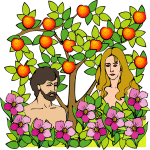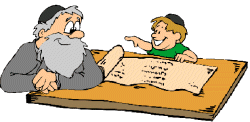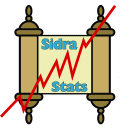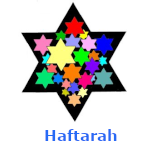Bereshit
בְּרֵאשִׁית
Gen. 1:1 -6:1
The First 7 days
A very long time ago there was no heaven, earth, darkness or light. HaShem said, “Let there be light,” and it was light. HaShem called the darkness night and the light day. That was the first day. On the second day HaShem said, “let  there be sky” and there was sky. On the third day HaShem created the dry land, which he called earth and the waters that he called seas. There were grass and trees and plants of all kinds on the land. On the fourth day HaShem added to the sky the sun and the stars so that there would always be some light. On the fifth day HaShem created the fish in the waters and the birds for the sky. On the sixth day HaShem created the animals and then he created man. By the seventh day HaShem was tired and rested, he blessed the seventh day and made it a day that all living things should rest. This was the first Shabbat!
there be sky” and there was sky. On the third day HaShem created the dry land, which he called earth and the waters that he called seas. There were grass and trees and plants of all kinds on the land. On the fourth day HaShem added to the sky the sun and the stars so that there would always be some light. On the fifth day HaShem created the fish in the waters and the birds for the sky. On the sixth day HaShem created the animals and then he created man. By the seventh day HaShem was tired and rested, he blessed the seventh day and made it a day that all living things should rest. This was the first Shabbat!
The Garden of Eden had all kinds of wonderful trees that HaShem had created. HaShem made two other trees there, one was the Tree of Life and the other was the Tree of The Knowledge of Good and Evil. When HaShem told Adam that he could eat from any tree except from the Tree of The Knowledge of Good and Evil or Adam would surely die. Even with all of the animals and beauty that was around him, Adam was lonely. So, while he slept HaShem took one of his ribs and made woman. HaShem called her Eve.
The Serpent
In the garden there was a serpent that was very evil. He asked Eve, “Did HaShem forbid you to eat the fruit of the trees in the garden?” “No,” Eve answered,”we can eat from any tree except from that one. If we do we will die.” The Serpent answered, “No, you won’t die.” Eve was tempted and ate the fruit and gave some to Adam to eat. Then they sewed fig leaves to cover themselves because they knew now that they were naked. HaShem called to Adam, “Where are you?” Adam hid from HaShem because he was ashamed. HaShem asked Adam if he had eaten from the Tree that HaShem had told him not to eat from. Adam said “Eve gave it to me.” HaShem said to Eve, “What is this you have done?” Eve answered HaShem saying, “The serpent tempted me.” HaShem was angry with the serpent and placed a curse on him. He told Eve that women would have trouble with their children. HaShem told Adam that he would have to work the soil for his food. HaShem drove Adam and Eve from the garden to a land to the east of the garden.
Cain & Able
Adam and Eve did as HaShem said and farmed the land and as time passed they had two sons, Cain and Abel. Abel became a shepherd and Cain became a farmer. Abel offered HaShem an offering of his best lamb. Cain took some crops and offered them. HaShem was pleased with Abel’s offering, but not with Cain’s. Cain grew very angry. HaShem asked him why he was angry. Cain did not answer him. Cain grew more angry with his brother and when he was back in the fields he struck his brother and killed him.
HaShem called out to Cain, “Cain! What have you done? You killed your own brother and for that you shall leave this place and never return.”
Cain was frightened that if he should wander in strange places that someone would kill him. HaShem said, “Whoever kills you will have seven-fold sorrow.”
Cain went to live in the Land of Nod. He wandered for many years and then married and had a son called Enoch. Cain built a city named for his son.
Adam and Eve had another son and they called him Seth. Seth followed HaShem and HaShem forgave them for their past.
Haftarah Connection

Isaiah 42.5-43.10
There are two connections between the Torah portion and the Haftarah.
This week’s Parsha begins with the creation of the universe. In the Haftarah the Prophet Isaiah reminds the people of Israel that HaShem is there, still creating. Creation is an ongoing thing, a miracle that is constantly going on.
Second, in the Torah portion we learn that we are given a choice between right and wrong. In the Haftarah, Isaiah says that Israel should be “a light for all the nations”, it is our responsibility to show others right from wrong.
Sidra Stats

- First of 54 Sedras in the Torah
- Written on 241 lines in the Sefer Torah
- 146 P’sukim (verses)
- 1,931 words
- 7,235 letters
Next week’s Parashat: Noah


